The nest cam has been turned off for the 2025 season. Thank you to all the dedicated viewers, Nature Moncton volunteers, City of Moncton staff, and DNRED staff for their collaboration.
Update: June 26, 2025
Update: June 26, 2025
Update: June 24, 2025
Update: June 24, 2025
Update: June 19, 2025
Update: June 19, 2025
Update: June 16, 2025
Update: June 16, 2025
Update: June 11, 2025
Update: June 11, 2025
Update: June 5, 2025
Update: June 5, 2025
Update: May 26, 2025
Update: May 26, 2025
Update: May 21, 2025
Update: May 21, 2025
Update: May 13, 2025
Update: May 13, 2025
Update: May 2, 2025
Update: May 2, 2025
Update: April 18, 2025
Update: April 18, 2025
Update: April 14, 2025
Update: April 14, 2025
Update: April 11, 2025
Update: April 11, 2025
Update: April 9, 2025
Update: April 9, 2025
Update: April 7, 2025
Update: April 7, 2025
Update: April 4, 2025
Update: April 4, 2025
Update: March 12, 2025
Update: March 12, 2025
The nest cam is located in a nest box on top of the Assomption building in Downtown Moncton, New Brunswick near the Petitcodiac River. This is an ideal location because Peregrine falcons nest close to rivers, on cliff edges of 50 meters or higher, and in areas with an abundance of preferred prey.
The nest box was constructed by local bird enthusiasts and installed in 2011. The box was first used by Peregrine falcons in 2012 and every year since.
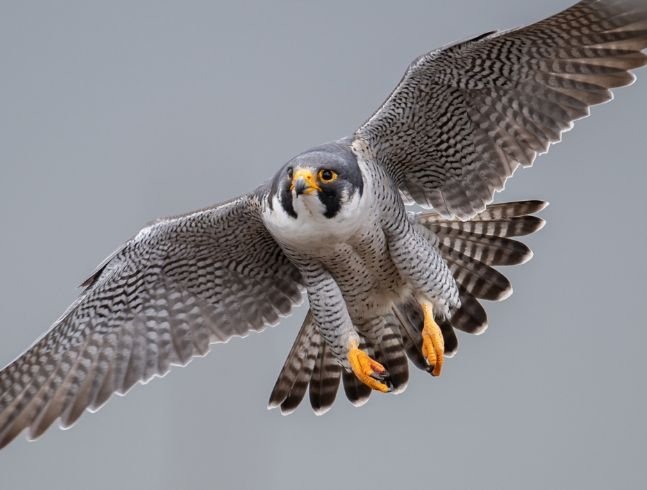
Species info
Peregrine falcons (Falco peregrinus) can be found on all continents except Antarctica. They prey on small to medium sized birds which can be caught in the air. They often sit on high perches, waiting to swoop down reaching speeds up to 112 km/h (69 mph). Peregrine falcons are often reported to be the fastest bird in the world.
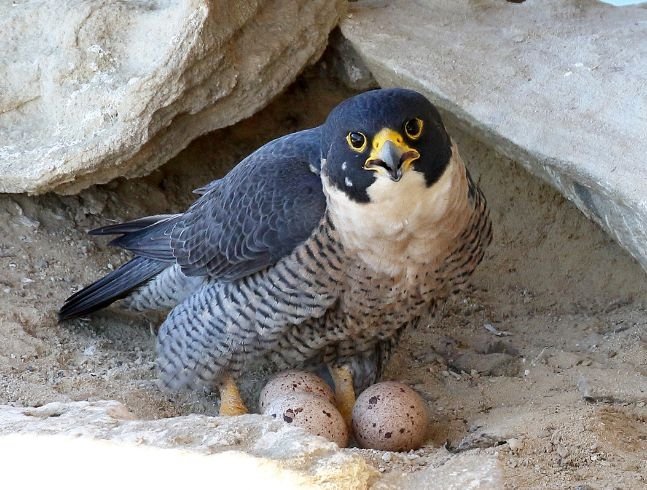
Conservation
Peregrine falcon population numbers have made a remarkable recovery after a significant crash in the 1970's due to DDT poisoning.
Although Canadian population numbers have stabilized, future threats could include:
- Loss of wetlands which are their important foraging areas.
- Severe weather events during key nesting and fledgling periods (too hot, too cold, too wet, too dry).
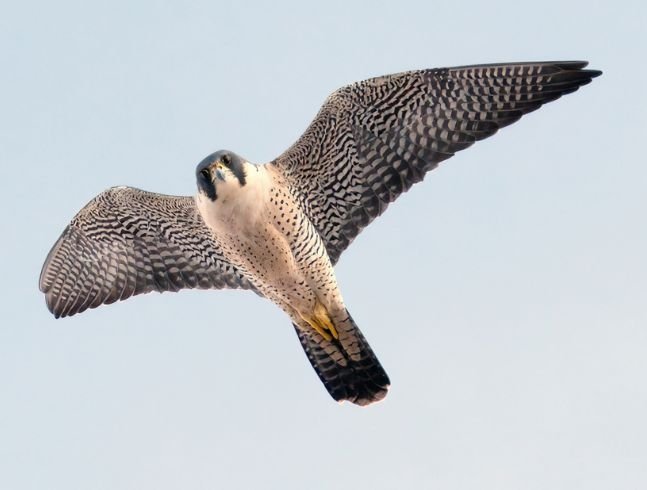
How you can help
- Reduce greenhouse gases being released into the environment by driving less, turning off lights, layering clothing accordingly instead of adjusting the thermostat, and more.
- Participate in local bird count events to report sightings of falcons and their prey.
- Support organizations which protect land for wildlife, including birds!
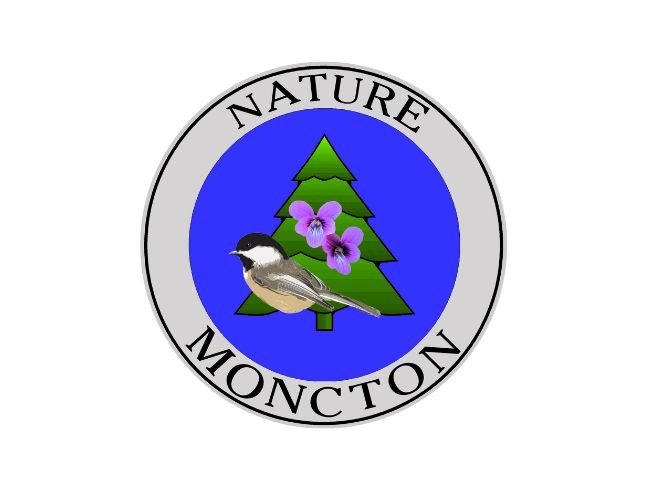
About the host
Nature Moncton is a local nature club which enjoys, studies, appreciates, shares, and protects nature.
Nature Moncton spearheaded this project and partnered with the Magnetic Hill Zoo to provide Moncton residents (and beyond) a unique way to connect with, observe, and learn about nature.
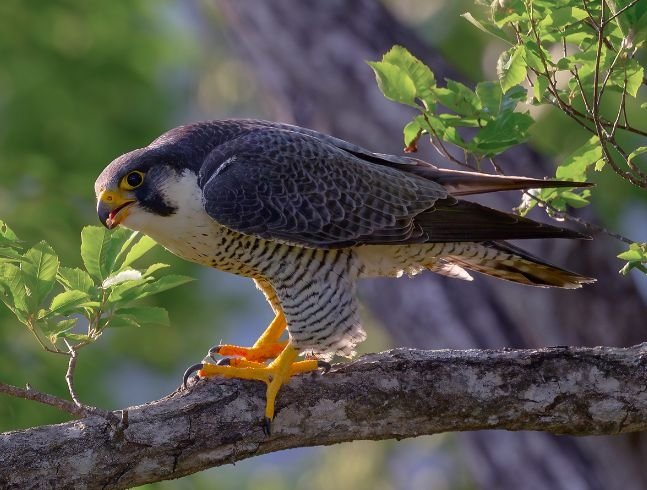
About the Zoo's conservation fund
The Magnetic Hill Zoo’s Conservation fund was created to financially support in situ education and conservation projects around the world – including the Peregrine falcon nest cam!
Funds are raised via donation bins at the Zoo, proceeds of some gift shop and map sales, dollar rounding at the Zoo’s gift shop cash, and more!
Nature Moncton strives to provide a live video feed without interruption. However, temporarily interruptions may occur due to technical difficulties or weather interference. If you would like to report a disruption of the live feed, please email naturemonctoncontact@gmail.com. No phone calls please.
2024 SEASON SUMMARY
Update: June 13, 2024
🐥The four young falcons are growing every day! The large fluffs of white down surrounding their legs are conspicuous and are often referred to as pantaloons. Although we can't hear it, we can see the falcons vocalizing often. Their parents rarely visit except to drop off food. The young falcons continue to flap their wings to strengthen their flight muscles and shake loose the remaining down feathers.
Update: June 5, 2024
🐥 With each passing day, the eyas (chicks) are looking increasingly darker. Their juvenile feathers are growing quickly and are pushing out the down which they'll pick off as they preen. Some of the chicks are starting to take large portions of prey from their parents to feed themselves. Some have also been seen opening and flapping their wings for exercise.
Update: May 31, 2024
🐥 The eyas (chicks) have been growing steadily these past 3 weeks! Pin feathers have been emerging on wing tips and tails. Their faces are now more defined, they sit upright, and are starting to sleep individually instead of in a pile. 🔍 Have you noticed the disproportionately large feet?! Their feet are now almost full grown, and they will start standing on their feet more often in the coming days.
Update: May 15, 2024
😍 Over Mother's Day weekend, four strong and demanding, hungry chicks hatched. Many people have reached out with photos and videos of the Peregrine falcon nest. We love how much joy this has brought to many! 👀 Keep tuning in as mom and dad take turns caring for the little ones. At day 5 their weight will have already doubled since they've hatched. They can also sit up and open their eyes. Continue watching as their second down starts to form followed by feathers. We still have lots to watch, learn and admire about this amazing species as the chicks normally fly away from their nest about 35-42 days after hatching. 💚💙
Update: May 10, 2024
🐣 Chick watch has officially begun! 🐤 At 3:40 pm this afternoon (May 10, 2024), the first Peregrine Falcon egg has pipped. If you look closely at the left most egg, you can see a very small glimpse of white downy feathers. 🥰 This is an exciting time for this Peregrine Falcon family!
Update: May 6, 2024
🤩 The Peregrine Falcons’ time spent incubating their 4 eggs should be coming to an end later this week. The incubation period for the Peregrine Falcons is 31-35 days, day 31 will be May 10th and day 35 will be May 14th! 🐣 We can anticipate seeing hatchlings covered in white down, their eyes closed, and weigh approx. 1.5 ounces. We look forward to seeing the hatchlings!
Update: April 18, 2024
The female Peregrine falcon laid the 4th and last egg on Tuesday April 9, 2024. The male and female falcons share the responsibility of incubating the eggs and will continue to do so for approximately 31-35 days (which would bring us to May 10-14, 2024 🐣).
If you need help distinguishing between the pair, the female ♀ falcon is larger, with lighter colored feathers, and a strip of white feathers between the eyes. The male ♂ falcon is smaller and has darker feathers, especially around the face. 💚💙
Update: April 9, 2024
🤩 How exciting! A 4th egg has been laid! Do you think we will see a 5th egg or do you think the female Peregrine Falcon is done laying for this year? 🥚 Did you notice the gradient in colors of the eggs? The color of Peregrine Falcon eggs can vary from cream to reddish color. The intensity of the red varies not only among female peregrines, but also from egg to egg within the same clutch. Nature sure is remarkable! 😍
Update: April 2, 2024
HOW EXCITING! We noticed an egg in the Peregrine Falcon nest on April 2, 2024. Peregrine nesting generally begins in March with two to five eggs laid in intervals in April. Once all eggs are laid, the incubation period starts for 31-35 days. Hatched chicks grow rapidly and fledge around day 40. When do you think we'll see the next egg? 🐣
Update: March 27, 2024
A pair of falcons have been frequenting the nest box 4-5 times per day. So far, we have observed courtship behavior between the pair, nest maintenance (adjusting the materials in the scrape) and prey/food sharing. The longest periods on the nest seem to be in the morning… Is love in the air? ❤️ Are we all ready for possible egg laying in next few weeks?!





